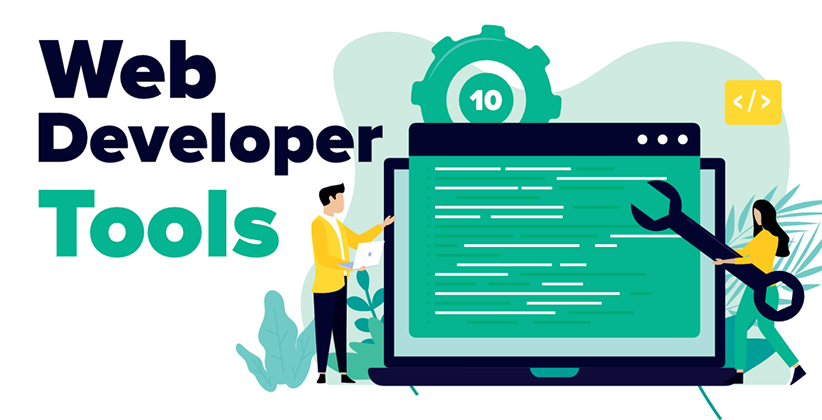
Web development has evolved significantly, and having the right tools can make a huge difference in efficiency, performance, and the overall development experience. Whether you’re a front-end, back-end, or full-stack developer, using the best tools can boost productivity, improve code quality, and streamline workflows.
Here are the top 10 web development tools that every developer should have in their toolkit.
Visual Studio Code (VS Code)
🔹 Category: Code Editor
🔹 Why Use It?
VS Code is a lightweight yet powerful code editor developed by Microsoft. It supports multiple programming languages, has built-in Git support, and offers an extensive marketplace of extensions for debugging, code formatting, and AI-powered suggestions (Copilot).
🔹 Key Features:
✅ IntelliSense for smart code completions
✅ Built-in terminal and debugging tools
✅ Customizable with themes and extensions
Git & GitHub
🔹 Category: Version Control
🔹 Why Use It?
Git is a distributed version control system that helps developers track code changes, collaborate with teams, and revert to previous versions when needed. GitHub provides a cloud-based repository to store, manage, and collaborate on projects.
🔹 Key Features:
✅ Branching & merging for collaborative coding
✅ Pull requests and code review tools
✅ GitHub Actions for CI/CD automation
3. Chrome DevTools
🔹 Category: Debugging & Performance Optimization
🔹 Why Use It?
Built into the Google Chrome browser, DevTools allows developers to inspect, debug, and optimize websites in real time. It’s essential for debugging JavaScript, improving page speed, and analyzing network requests.
🔹 Key Features:
✅ Inspect and edit HTML/CSS in real time
✅ JavaScript debugging and performance profiling
✅ Network request analysis and page load optimization
📥 Learn More About Chrome DevTools
4. Node.js & npm
🔹 Category: JavaScript Runtime & Package Manager
🔹 Why Use It?
Node.js enables developers to build fast and scalable server-side applications using JavaScript. npm (Node Package Manager) provides access to millions of open-source packages to speed up development.
🔹 Key Features:
✅ Non-blocking, event-driven architecture for high performance
✅ Vast ecosystem of packages via npm
✅ Ideal for building APIs and full-stack applications
5. Bootstrap
🔹 Category: Front-End Framework
🔹 Why Use It?
Bootstrap is a responsive front-end framework that makes designing web pages easier with pre-built components and a mobile-first grid system. It’s perfect for developers who want to create professional-looking websites quickly.
🔹 Key Features:
✅ Ready-to-use UI components (buttons, forms, modals)
✅ Grid system for responsive layouts
✅ Customizable via CSS and JavaScript
6. Postman
🔹 Category: API Testing
🔹 Why Use It?
Postman is an API development tool that helps developers test, debug, and document APIs efficiently. It provides an intuitive interface to send HTTP requests, check responses, and collaborate on API workflows.
🔹 Key Features:
✅ Create and automate API testing
✅ Mock servers for testing API responses
✅ Generate API documentation automatically
7. Webpack
🔹 Category: Module Bundler
🔹 Why Use It?
Webpack is a powerful tool that helps developers bundle JavaScript, CSS, and images efficiently. It optimizes assets for faster load times and improves performance by reducing the number of HTTP requests.
🔹 Key Features:
✅ Code splitting for optimized performance
✅ Asset management for CSS, images, and JavaScript
✅ Works with React, Vue, and Angular
8. Laravel
🔹 Category: PHP Framework
🔹 Why Use It?
Laravel is a popular PHP framework designed for scalable web applications. It simplifies database management, authentication, and routing, making it a great choice for back-end development.
🔹 Key Features:
✅ Elegant syntax and MVC architecture
✅ Built-in authentication and security features
✅ Blade templating engine for front-end integration
9. Figma
🔹 Category: UI/UX Design Tool
🔹 Why Use It?
Figma is a cloud-based design and prototyping tool that helps developers and designers collaborate on UI/UX design. It simplifies design handoff by allowing developers to extract assets and CSS styles directly.
🔹 Key Features:
✅ Real-time collaboration with teams
✅ Design-to-code handoff for developers
✅ Works on web browsers—no installation required
10. Lighthouse
🔹 Category: Website Performance & SEO Tool
🔹 Why Use It?
Lighthouse is an open-source tool by Google that helps developers analyze and optimize web pages for performance, accessibility, SEO, and best practices.
🔹 Key Features:
✅ Generate detailed performance reports
✅ Identify SEO and accessibility improvements
✅ Improve Core Web Vitals for better search rankings
Final Thoughts
The right web development tools can increase efficiency, improve code quality, and streamline development workflows. Whether you’re working on front-end, back-end, or full-stack projects, incorporating these tools will make development faster, easier, and more productive.